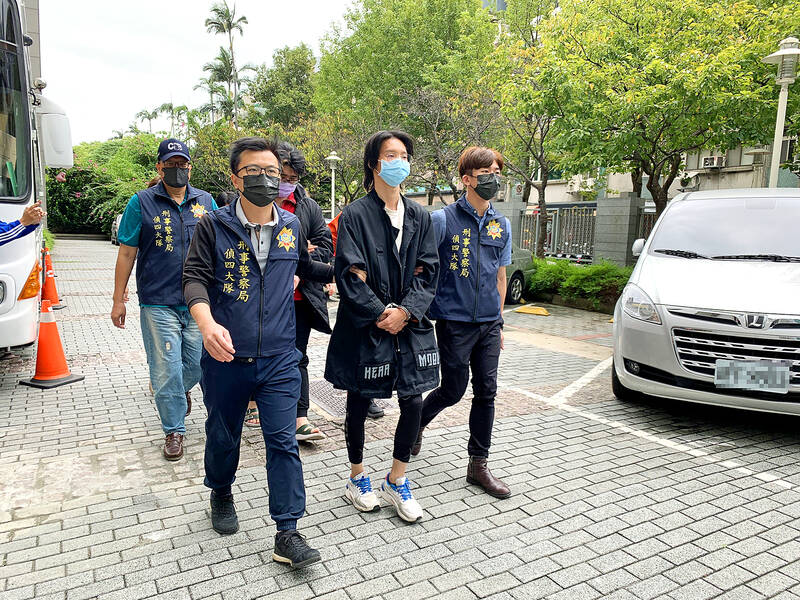The Supreme Court on Wednesday rejected an appeal by a Taiwanese YouTuber and upheld his five-year prison sentence by a lower court for creating non-consensual deepfake pornography featuring the likenesses of real individuals.
In its ruling, the Supreme Court said there was no error in the sentence handed down by the High Court in Chu Yu-chen’s (朱玉宸) second trial last year, adding that the verdict was justified based on solid evidence.
Chu, who goes by Xiaoyu (小玉) on YouTube, was found guilty in July 2022 by the New Taipei City District Court of contravening the Personal Data Protection Act (個人資料保護法) for editing the likenesses of 119 individuals, including politicians and social media influencers, into pornographic videos.

Photo: CNA
He, along with his assistant Chuang Hsin-jui (莊炘睿), made more than NT$10 million (US$308,518) from distributing the videos, court documents said.
Chu was given a five-and-a-half-year sentence, while Chuang received three years and eight months, but both were commutable to a fine.
An appeal was filed by prosecutors, who argued that the sentence was too lenient. as they could each pay a fine in lieu of jail time.
In December last year, the High Court revoked the original sentence and revised Chu’s imprisonment to five years, which cannot be commuted to a fine.
Using the likeness of individuals to create deepfake porn videos for public viewing not only tarnishes their reputation, but also harms their mental health, the Supreme Court ruled.
Chu will have to serve an additional 20 months in prison if he is unable to pay a fine after the high court imposed sentencing enhancements.
Meanwhile, the high court at the time also increased Chuang’s sentence to four-and-a-half years, commutable to a fine.
Chu and Chuang subsequently filed an appeal against the verdicts, but the original verdicts were upheld by the Supreme Court on Wednesday and its decision is final.

Alain Robert, known as the "French Spider-Man," praised Alex Honnold as exceptionally well-prepared after the US climber completed a free solo ascent of Taipei 101 yesterday. Robert said Honnold's ascent of the 508m-tall skyscraper in just more than one-and-a-half hours without using safety ropes or equipment was a remarkable achievement. "This is my life," he said in an interview conducted in French, adding that he liked the feeling of being "on the edge of danger." The 63-year-old Frenchman climbed Taipei 101 using ropes in December 2004, taking about four hours to reach the top. On a one-to-10 scale of difficulty, Robert said Taipei 101

Nipah virus infection is to be officially listed as a category 5 notifiable infectious disease in Taiwan in March, while clinical treatment guidelines are being formulated, the Centers for Disease Control (CDC) said yesterday. With Nipah infections being reported in other countries and considering its relatively high fatality rate, the centers on Jan. 16 announced that it would be listed as a notifiable infectious disease to bolster the nation’s systematic early warning system and increase public awareness, the CDC said. Bangladesh reported four fatal cases last year in separate districts, with three linked to raw date palm sap consumption, CDC Epidemic Intelligence

Taiwanese and US defense groups are collaborating to introduce deployable, semi-autonomous manufacturing systems for drones and components in a boost to the nation’s supply chain resilience. Taiwan’s G-Tech Optroelectronics Corp subsidiary GTOC and the US’ Aerkomm Inc on Friday announced an agreement with fellow US-based Firestorm Lab to adopt the latter’s xCell, a technology featuring 3D printers fitted in 6.1m container units. The systems enable aerial platforms and parts to be produced in high volumes from dispersed nodes capable of rapid redeployment, to minimize the risk of enemy strikes and to meet field requirements, they said. Firestorm chief technology officer Ian Muceus said

MORE FALL: An investigation into one of Xi’s key cronies, part of a broader ‘anti-corruption’ drive, indicates that he might have a deep distrust in the military, an expert said China’s latest military purge underscores systemic risks in its shift from collective leadership to sole rule under Chinese President Xi Jinping (習近平), and could disrupt its chain of command and military capabilities, a national security official said yesterday. If decisionmaking within the Chinese Communist Party has become “irrational” under one-man rule, the Taiwan Strait and the regional situation must be approached with extreme caution, given unforeseen risks, they added. The anonymous official made the remarks as China’s Central Military Commission Vice Chairman Zhang Youxia (張又俠) and Joint Staff Department Chief of Staff Liu Zhenli (劉振立) were reportedly being investigated for suspected “serious